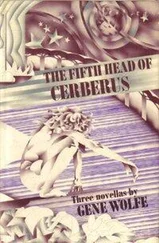May it not be, she asked (and even now I am not certain I can answer), that instead of traveling, as has always been supposed, down three roads to the same destination, they are actually traveling toward three quite different ones? After all, when in common life we behold three roads issuing from the same crossing, we do not assume they all proceed toward the same goal.
I found (and find) this suggestion as rational as it is repellent, and it represents for me all that monomaniacal fabric of argument, so tightly woven that not even the tiniest objection or spark of light can escape its net, in which human minds become enmeshed whenever the subject is one in which no appeal to fact is possible.
As a fact the Claw was thus an incommensurable. No quantity of money, no piling up of archipelagoes or empires could approach it in value any more than the indefinite multiplication of horizontal distance could be made to equal vertical distance. If it was, as I believed, a thing from outside the universe, then its light, which I had seen shine faintly so often, and a few times brightly, was in some sense the only light we had. If it were destroyed, we were left fumbling in the dark.
I thought I had valued it highly in all the days in which I had carried it, but as I sat there upon that shelving stone overlooking the benighted waters of Lake Diuturna, I realized what a fool I had been to carry it at all, through all my wild scrapes and insane adventures, until I lost it at last. Just before sunrise I vowed to take my own life if I did not find it before the dark came again.
Whether or not I could have kept that vow I cannot say. I have loved life so long as I can remember. (It was, I believe, that love of life that gave me whatever skill I possessed at my art, because I could not bear to see the flame I cherished extinguished other than perfectly.) Surely I loved my own life, now mingled with Thecla’s, as much as others. If I had broken that vow, it would not have been the first.
There was no need to. About mid morning of one of the most pleasant days I have ever experienced, when the sunlight was a warm caress and the lapping of the water below a gentle music, I found the gem — or what remained of it.
It had shattered on the rocks; there were pieces large enough to adorn a tetrarchic ring and flecks no bigger than the bright specks we see in mica, but nothing more. Weeping, I gathered the fragments bit by bit, and when I knew them to be as lifeless as the jewels miners delve up every day, the plundered finery of the long dead, I carried them to the lake and cast them in.
I made three of those climbs down to the water’s edge with a tiny heap of bluish chips held in the hollow of one hand, each time returning to the place where I had found the broken gem to search for more; and after the third I found, wedged deep between two stones so that I had, in the end, to return to the pine grove to break twigs with which to free it and fish it up, something that was neither azure nor a gem, but that shone with an intense white light, like a star.
It was with curiosity rather than reverence that I drew it out. It was so unlike the treasure I had sought — or at least, unlike the broken bits of it I had been finding — that it hardly occurred to me until I held it that the two might be related. I cannot say how it is possible for an object in itself black to give light, but this did. It might have been carved in jet, so dark it was and so highly polished; yet it shone, a claw as long as the last joint of my smallest finger, cruelly hooked and needle-pointed, the reality of that dark core at the heart of the gem, which must have been no more than a container for it, a lipsanotheca or pyx.
For a long time I knelt with my back to the castle, looking from this strange, gleaming treasure to the waves and back again while I tried to grasp its significance. Seeing it thus without its case of sapphire, I felt profoundly an effect I had never noticed at all during the days before it had been taken from me in the hetman’s house. Whenever I looked at it, it seemed to erase thought. Not as wine and certain drugs do, by rendering the mind unfit for it, but by replacing it with a higher state for which I know no name. Again and again I felt myself enter this state, rising always higher until I feared I should never return to the mode of consciousness I call normality; and again and again I tore myself from it. Each time I emerged, I felt I had gained some inexpressible insight into immense realities.
At last, after a long series of these bold advances and fearful retreats, I came to understand that I should never reach any real knowledge of the tiny thing I held, and with that thought (for it was a thought) came a third state, one of happy obedience to I knew not what, an obedience without reflection because there was no longer anything to reflect upon, and without the least tincture of rebellion. This state endured all that day and a large part of the next, by which time I was already deep into the hills.
Here I pause, having carried you, reader, from fortress to fortress — from the walled city of Thrax, dominating the upper Acis, to the castle of the giant, dominating the northern shore of remote Lake Diuturna. Thrax was for me the gateway to the wild mountains. So too, this lonely tower was to prove a gateway — the very threshold of the war, of which a single far-flung skirmish had taken place here. From that time to this, that war has engaged my attention almost without cease.
Here I pause. If you have no desire to plunge into the struggle beside me, reader, I do not condemn you. It is no easy one.
Appendix
A Note on Provincial Administration
SEVERIAN’S BRIEF RECORD of his career in Thrax is the best (though not the only) evidence we have concerning the business of government in the age of the Commonwealth, as it is carried out beyond the shining corridors of the House Absolute and the teeming streets of Nessus. Clearly, our own distinctions between the legislative, executive, and judicial branches do not apply — no doubt administrators like Abdiesus would laugh at our notion that laws should be made by one set of people, put into effect by a second, and judged by a third. They would consider such a system unworkable, as indeed it is proving to be.
At the period of the manuscripts, archons and tetrarchs are appointed by the Autarch, who as the representative of the people has all power in his hands. (See, however, Famulimus’s remark on this topic to Severian.) These officials are expected to enforce the commands of the Autarch and to administer justice in accordance with the received usages of the populations they govern. They are also empowered to make local laws — valid only over the area governed by the lawmaker and only during his term of office — and to enforce them with the threat of death. In Thrax, as well as in the House Absolute and the Citadel, imprisonment for a fixed term — our own most common punishment — seems unknown. Prisoners in the Vincula are held awaiting torture or execution, or as hostages for the good behavior of their friends and relatives.
As the manuscript clearly shows, the supervision of the Vincula (“the house of chains”) is only one of the duties of the lictor (“he who binds”). This officer is the chief subordinate of the archon involved with the administration of criminal justice. On certain ceremonial occasions he walks before his master bearing a naked sword, a potent reminder of the archon’s authority. During sessions of the archon’s court (as Severian complains) he is required to stand at the left of the bench. Executions and other major acts of judicial punishment are personally performed by him, and he supervises the activities of the clavigers (“those with keys”).
These clavigers are not only the guards of the Vincula; they act also as a detective police, a function made easier by their opportunities for extorting information from their prisoners. The keys they bear seem sufficiently large to be used as bludgeons, and are thus their weapons as well as their tools and their emblems of authority.
Читать дальше










